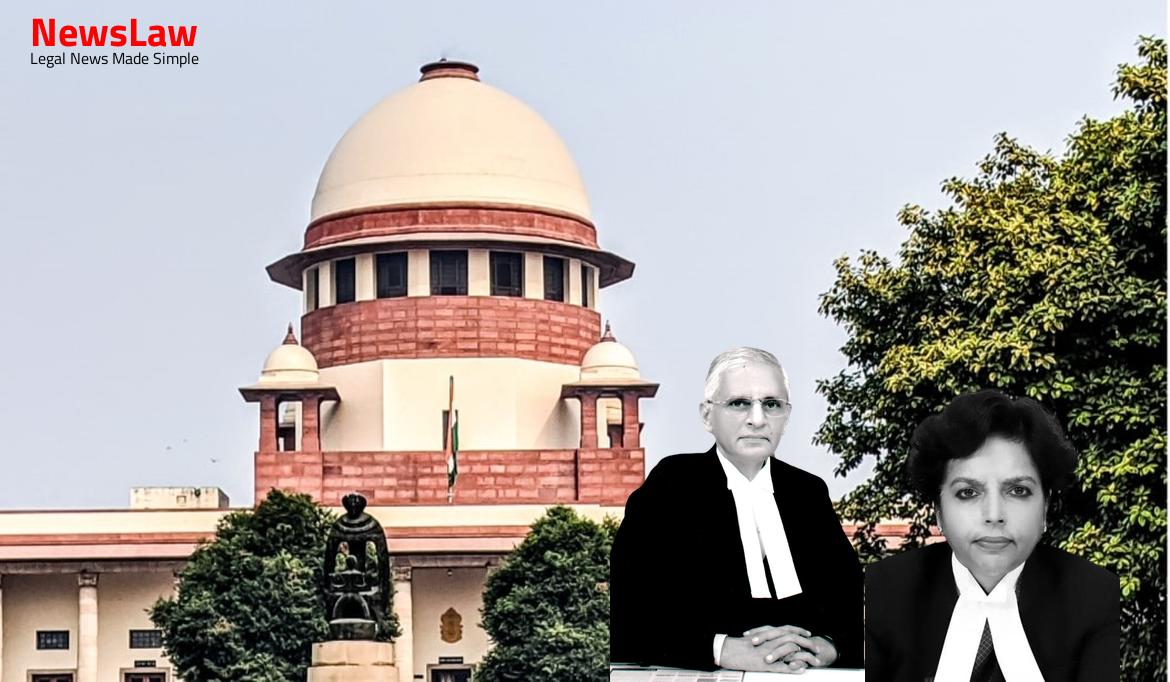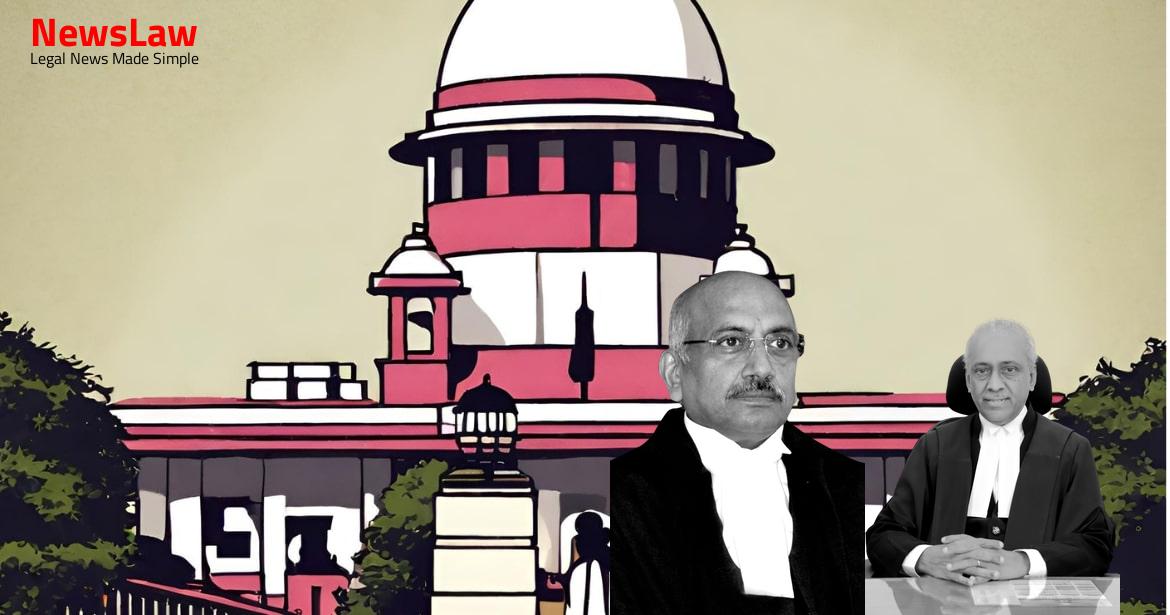Delve into the detailed legal analysis provided by the court in a recent case concerning time limitation in arbitration challenges. The focus is on the interpretation of Section 34 of the Arbitration and Conciliation Act, 1996, and the exclusion of Section 5 of the Limitation Act in such proceedings. The court’s thorough examination of the statutory provisions highlights the importance of adhering to prescribed time limits in challenging arbitral awards. Follow along to understand the nuances of time limitation in arbitration law and the court’s reasoned decision on delay condonation.
Facts
- The respondent filed an appeal before the Division Bench against an order that condoned a delay of 185 days beyond the allowed time period.
- The respondent moved for condonation of delay under Section 5 of the Limitation Act, citing lack of knowledge of the proceedings until receiving summons from the execution court.
- The Division Bench allowed the appeals, condoned the delay, and directed the Arbitration Petitions for admission hearing.
- The Arbitrator passed an award in favor of the appellant, dispatching copies to both parties.
- The appellant filed an execution petition to recover the amount due under the award, leading the respondent to challenge the arbitral award under Section 34 of the Act 1996.
- The dispute between the parties arose from a loan facility for tractors, detailed in agreement No. 366533 dated 24.10.2005.
- Respondent refused to accept the registered post containing the award
- Delay in accepting the award was not condoned
Also Read: Supreme Court Upholds Rejection of Plaint Under Order VII Rule 11 of CPC: A Critical Analysis
Arguments
- Appellant is aggrieved and seeks to set aside the order passed by the Division Bench.
- Appellant contends that the respondent’s petition under Section 34 of Act 1996 should be dismissed as barred by time.
- Arguments were heard from both appellant’s counsel and respondent’s counsel.
- Main issue for consideration is whether the petition was filed within the limitation period as per Act 1996.
- If not within the limitation period, the question is whether the delay can be condoned under Section 5 of the Limitation Act.
- Further consideration is on the Division Bench’s decision to condone the delay.
Also Read: Validity of Debt and Enforcement of Section 138 NI Act
Analysis
- Section 34(3) of the Arbitration and Conciliation Act, 1996 provides for the period of limitation for setting aside an arbitral award.
- The proviso to sub-section (3) of Section 34 limits the period of condonable delay to thirty days.
- Section 5 of the Limitation Act, which allows for the condonation of delay without an outer limit, does not apply to proceedings under Section 34(3) of the Act.
- Recourse to a court against an arbitral award can only be made through an application for setting aside as per sub-section (2) and sub-section (3) of Section 34.
- Judicial intervention in arbitration matters is restricted as per Section 5 of the Act, with exceptions provided within the Act.
- Previous court decisions have recognized the self-contained scope for condonation of delay in the proviso to Section 34(3) of the Act.
- The court deemed the refusal of service as good service in law.
- The time limit to challenge an award under Section 34 of the 1996 Act is absolute and cannot be extended by the court under Section 5 of the Limitation Act.
- The importance of the period fixed under Section 34 is emphasized by the provisions of Section 36, which state that the award will be enforced as if it were a decree of the court after the time to challenge it has expired.
- The history and scheme of the 1996 Act support the conclusion that the time-limit to challenge an award is unextendible by the court.
- The court highlighted the objective of minimizing the supervisory role of courts in the arbitral process as stated in the Arbitration and Conciliation Bill, 1995, which preceded the 1996 Act.
- There was a significant departure from the provisions of the Arbitration Act, 1940 in terms of enforcing arbitral awards.
- The refusal to accept service of the arbitral award was noted by the postal authority, establishing the date when the petitioners were deemed to have been served with the award.
- The respondent resisted the petition under Section 34 on the grounds that it was filed beyond the statutory period.
- The provisions of Section 5 of the Limitation Act, 1963 do not apply to petitions under Section 34 of the Arbitration and Conciliation Act.
- The court concluded that entertaining an application to set aside an award beyond the extended period as per the proviso would render specific statutory phrases meaningless, which is not justifiable under any principle of interpretation.
- Section 34 of the Arbitration and Conciliation Act, 1996 curtails the court’s powers by excluding the operation of Section 5 of the Limitation Act.
- The proviso to Section 34(3) allows the court to entertain a challenge to an award after the three-month period, but only within an additional 30 days, ‘but not thereafter.’
- If a petition is filed beyond the prescribed period, the court may condone the delay only up to 30 days, provided sufficient cause is shown.
- The phrase ‘but not thereafter’ in the proviso of Section 34(3) indicates a mandatory nature, leaving no room for doubt.
- The Supreme Court has held in various cases that the provisions of Section 34(3) of the Act exclude the application of Section 5 of the Limitation Act, 1963.
- Section 5 of the Limitation Act cannot be used to condone delay beyond the period prescribed under Section 34(3) of the Act 1996.
- The Division Bench was not justified in casually condoning the delay in this case.
- Referring to the respondent being a farmer and no amount being due, the Division Bench misapplied the decision of Collector, Land Acquisition, Anantnag vs. Mst. Katiji and Others. The decision’s basis was used erroneously to allow the appeal.
- While a delay of 197 days may not seem excessive, it should be condoned in appropriate cases to not defeat a meritorious case.
- The case of Mst. Katiji is cited as an example where delay condonation powers were available and not excluded, but such powers can only be invoked when Section 5 of the Limitation Act is applicable.
Also Read: Enlargement on Bail in Illegal Mining Case
Decision
- Order dated 24.09.2012 set aside
- Order of learned Single Judge restored
- Appeals allowed
- No order as to costs
Case Title: MAHINDRA AND MAHINDRA FINANCIAL SERVIES LTD. Vs. MAHESHBHAI TINABHAI RATHOD (2021 INSC 900)
Case Number: C.A. No.-011477-011477 / 2014



